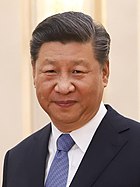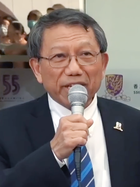2022 Shangean legislative election
| |||||||||||||||||||||||||||||
700 of the 750 seats in the Legislative Council 376 seats needed for a majority | |||||||||||||||||||||||||||||
|---|---|---|---|---|---|---|---|---|---|---|---|---|---|---|---|---|---|---|---|---|---|---|---|---|---|---|---|---|---|
| |||||||||||||||||||||||||||||
| |||||||||||||||||||||||||||||
The next election for the Shangean legislative council is due to be held across the month of January 2022. Voting will take place for 700 of the 750 seats in the legislative council. It is the first national election to be held since the start of Normalisation in 2017.
Electoral process
Shangea holds elections every five years for 700 of the seats in the Legislative Council (550 elected by universal suffrage and 150 elected through occupational constituencies). Voting for the directly-elected seats is done through a mixed member majoritarian system with 300 seats elected by single-member plurality voting and 250 members through party-list proportional representation. The proportional seats retain a 5% electoral threshold with the entire country treated as single constituency and are appropriated through the Li-Qiao method. Occupational constituencies use single-member plurality voting.
Voters were given two ballot papers: for proportional seats and for district seats. Voting is either done by paper or through electronic voting in certain localities. Ballots are deposited in clear boxes and voters must dip their right thumb in ink after voting in order to deter electoral fraud. Shangeans living overseas can vote in either the embassies and consulates, mobile polling stations, or by post.
Eligible voters must be Shangean citizens, 18 or older than 18, an ordinary resident of the polling area of the district seats and registered to vote (name included in the electoral rolls), possess a valid voter identification card issued by the National Electoral Bureau. The National Electoral Bureau can bar people from voting if they have comitted certain crimes or show "disrespect for the electoral process". For occupational constituencies voters are chosen by the National Electoral Bureau and approved by the Examination Council.
Voting is staggered over two weeks and held in five stages with different provinces voting during these sections. Voting during each stage lasts from 7AM to 11PM. Campaigning and polling is strictly prohibited during this period. The National Electoral Bureau must release the results of the election 14 days after the final polling stations close.
The National Electoral Bureau announced in December 2021 that 297,859,377 people were on the electoral roll. There are 425,108 polling stations averaging about 700 voters per station. Around 3,500,000 individuals and 14,507 companies vote in occupational constituencies. 28 million people are involved in the running of the electoral process consisting of election officers and polling station guards. A budget of €3.2 billion has been allocated to hold the election.
Background
Timetable
| 28 October 2021 | The State Presidium fixes the date of elections from the 7th to 16th January in 2022. |
| 12 November 2021 | Last day members of the public could register to vote. |
| 14 November 2021 | Last day for candidates to file nomination papers. |
| 5 December 2021 | Formal dissolution of the Legislative Council; start of campaign period. |
| 7 January 2022 | Phase 1 of voting in Qigao, Heping, Luoyuan, Baiqiao, Baishadao, Nanqing and Meishan provinces. |
| 10 January 2022 | Phase 2 of voting in Zhongan, Rongzhuo, Wushan, Tuohe, and Chanwa provinces. |
| 12 January 2022 | Phase 3 of voting in Anqian, Weishang, Shenkong, Xiangshan, Yongba and Baozhou provinces. |
| 15 January 2022 | Phase 4 of voting in the occupational constituencies. |
| 16 January 2022 | Phase 5 of voting in Chengchao, Jianghui, Xufang, Zhijian and Yunjin provinces. |
| 16 February 2022 | New Legislative Council Assembled |
Parties
| Party | Ideology | Leader | Alliance | Outgoing seats |
In government | ||
|---|---|---|---|---|---|---|---|

|
Society for Restoring Benevolence | National Principlism, Shangean nationalism | Jiang Zhongyu | Patriotic Alliance for a Harmonious Country | 420 / 750
|
||
| Association for Promoting Democracy | Shangean ultranationalism, Revanchism | Zhao Xiaojing | None | 76 / 750
|
|||
| Movement for National Principlism | National Principlism, Left-wing populism | Yang Weisheng | National Regeneration Movement | 24 / 750
|
|||
| Democratic Party of the People | National Principlism, Liberal conservatism | Dong Xiaotong | National Regeneration Movement | 0 / 750
|
|||

|
Shangean Democratic Communist Party | Communism, Democratic Socialism | Wei Pengfei | None | 0 / 750
|
||
| Reform and Innovation Alliance | Neoliberalism, Social conservatism | Yin Hong | None | 0 / 750
|
|||
| Liberal Socialist Party | Social democracy, Social liberalism | Ding Xifeng | None | 0 / 750
|
|||
| National Solidarity Party | National Principlism, National conservatism | Zeng Bojing | None | 0 / 750
|
|||



